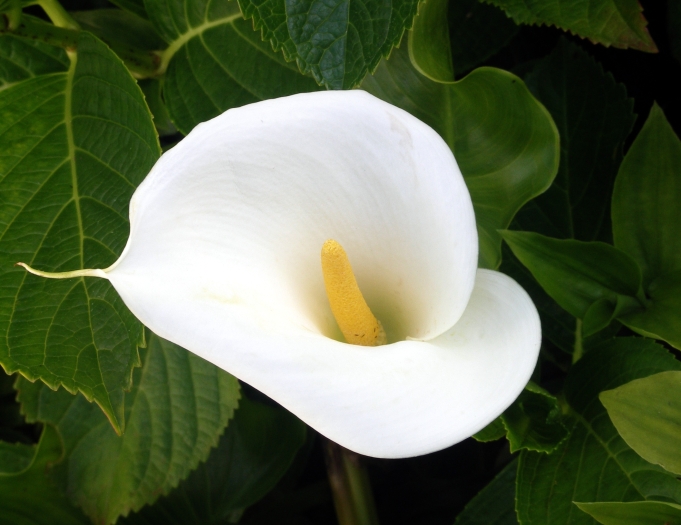Calla Lily
(Zantedeschia aethiopica)
Calla Lily (Zantedeschia aethiopica)
/
/

Alvesgaspar
CC BY 2.5
Image By:
Alvesgaspar
Recorded By:
Copyright:
CC BY 2.5
Copyright Notice:
Photo by: Alvesgaspar | License Type: CC BY 2.5 | License URL: https://creativecommons.org/licenses/by/2.5 | Uploader: Alvesgaspar | Publisher: Wikimedia Commons | Title: Jarro-2.jpg | Notes: |






















































Estimated Native Range
Summary
Zantedeschia aethiopica, commonly known as Calla Lily, is an herbaceous perennial plant with a rhizomatous growth habit. It is evergreen in regions with consistent rainfall and warm temperatures, and deciduous in areas with a pronounced dry season. It is native to marshy areas, riverbanks, and damp open grasslands in Southern Africa. The plant typically grows to 0.6–1 m (2.0–3.3 ft) tall and forms large clumps of broad, arrow-shaped dark green leaves that can reach up to 45 cm (18 in) in length. The Calla Lily is particularly noted for its striking inflorescences, which are large and produced in spring, summer, and autumn. Each inflorescence consists of a pure white spathe, resembling a flower, up to 25 cm (9.8 in) long, and a central yellow spadix that can be up to 90 mm (3+1⁄2 in) long, emitting a faint, sweet fragrance.
The Calla Lily is valued for its elegant appearance and is often used in water gardens, as a border plant, or in containers. It thrives in full sun to part shade and prefers consistently moist soil with slow drainage. While it can tolerate a range of soil types, it does best in rich, organic soils. The plant’s lush foliage and showy spathes make it a popular choice for ornamental purposes. However, it can be susceptible to root rot if overwatered or planted in poorly drained soils. Zantedeschia aethiopica can be potentially invasive in non-native regions, such as the Indian Ocean islands and parts of the United States, due to its vigorous growth and ability to spread through rhizomes and seeds. Gardeners should be cautious and check local regulations before planting to prevent ecological disruptions.CC BY-SA 4.0
The Calla Lily is valued for its elegant appearance and is often used in water gardens, as a border plant, or in containers. It thrives in full sun to part shade and prefers consistently moist soil with slow drainage. While it can tolerate a range of soil types, it does best in rich, organic soils. The plant’s lush foliage and showy spathes make it a popular choice for ornamental purposes. However, it can be susceptible to root rot if overwatered or planted in poorly drained soils. Zantedeschia aethiopica can be potentially invasive in non-native regions, such as the Indian Ocean islands and parts of the United States, due to its vigorous growth and ability to spread through rhizomes and seeds. Gardeners should be cautious and check local regulations before planting to prevent ecological disruptions.CC BY-SA 4.0
Plant Description
- Plant Type: Herb
- Height: 2-3 feet
- Width: 1.5-2 feet
- Growth Rate: Moderate
- Flower Color: White
- Flowering Season: Summer
- Leaf Retention: Evergreen
Growth Requirements
- Sun: Full Sun, Part Shade
- Water: Medium, High
- Drainage: Slow
Common Uses
Bee Garden, Bird Garden, Border Plant, Deer Resistant, Fragrant, Potted Plant, Rabbit Resistant, Showy Flowers, Water Garden
Natural Habitat
Native to marshy areas, riverbanks, and damp open grasslands in Southern Africa
Other Names
Common Names: Arum-Lily, Calla-Lily, Common Calla, 海芋, Arum, Cornet Blanc, Pig-Lily
Scientific Names: , Zantedeschia aethiopica, Calla aethiopica, Richardia aethiopica, Richardia africana, Arodes aethiopicum, Aroides aethiopicum, Calla aethiopica var. nana, Calla ambigua, Calla moschata
GBIF Accepted Name: Zantedeschia aethiopica (L.) Spreng.